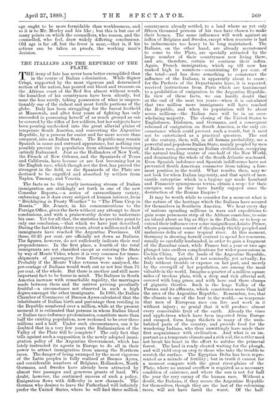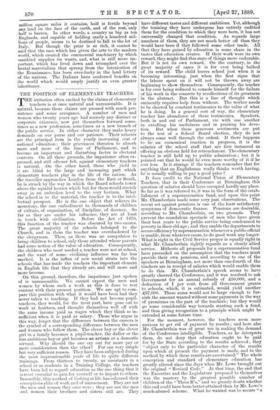THE ITALIANS AND THE REPUBLIC OF THE PLATE. T TER irony
of fate has never been better exemplified than in the course of Italian colonisation. While Signor Crispi, supported by the most vigorous and determined section of the nation, has poured out blood and treasure on the African coast of the Red Sea almost without result, the humblest of his countrymen have been silently, but none the less surely, taking possession of what is unques- tionably one of the richest and most fertile portions of the globe. Italy has been struggling for the barest foothold at Massowah, and after four years of fighting has only succeeded in possessing herself of as much ground as can be covered by the rifles of her soldiers, but her subjects have been pouring unchecked into the great alluvial plains of temperate South America, and converting the Argentine Republic, by a process far easier and far more secure than conquest, into an Italian State. The Republic may remain Spanish in name and outward appearance, but nothing can possibly prevent its population from ultimately becoming entirely Italianised. Just as the Hollanders of New York, the French of New Orleans, and the Spaniards of Texas and California, have become or are fast becoming lost in the English race, which though not the first, has proved the strongest in the field, so the Spaniards of the Plate are destined to be engulfed and absorbed by settlers from Naples, Tuscany, and Venetia.
The facts as to the yearly increasing stream of Italian immigration are strikingly set forth in one of the new Consular Reports,—a series of extraordinary variety, embracing as it does every subject of human interest, from " Bricklaying in Frosty Weather " to " The Plum Crop in Bosnia." Mr. Jenner, in his communications to the Foreign Office, gives the facts without any attempt to draw conclusions, and with a praiseworthy desire to understate his case. Yet for all that, the statistics he provides point to only one conclusion,—that which we have just described. During the last thirty-three years, about a million and a half immigrants have reached the Argentine Provinces. Of these, 65.25 per cent. are officially set down as Italians. The figures, however, do not sufficiently indicate their real preponderance. In the first place, a fourth of the total immigrants are not classified except as entering the State by way of Monte Video, where it is very common for trans- shipments of passengers from Europe to take place. Probably if the Monte Video returns were analysed, the per-tentage of Italians would work out as not less than 75 per cent. of the whole. But there is another and still more important fact to be borne in mind. The Italians in South America, increase with remarkable rapidity, the marriages made between them and the natives proving peculiarly fruitful—a circumstance not observed in such a high degree amongst the other immigrants. In 1885, the Italian Chamber of Commerce of Buenos Ayres calculated that the inhabitants of Italian birth and parentage then residing in the Republic numbered over a million, while at the present moment it is estimated that persons in whom Italian blood or Italian race-influence predominates, constitute more than half the existing population, now reckoned to be over three millions and a half. Under such circumstances, can it be doubted that in a very few years the Italianisation of the Valley of the Plate will be complete ? The only fact that tells against such a supposition is the newly adopted immi- gration policy of the Argentine Government, which has lately instructed its agents in Europe to do all in their power to attract immigration from among the Northern races. The danger of being swamped by the most vigorous of the Latin peoples is fully realised at Buenos Ayres, and considerable numbers of Belgians, Hollanders, North Germans, and Swedes have already been attracted by almost free passages and generous grants of land. We doubt, however, the continued success of such a policy. Emigration flows with difficulty in new channels. The German who desires to leave the Fatherland will infinitely prefer the United States, where he will find. three million countrymen already settled, to a land where as yet only fifteen thousand persons of his race have chosen to make their homes. The same influences will work against an influx of Belgians and Swedes, except when recourse is had to inducements too heavy to be long maintained. The Italians, on the other hand, are already accustomed to come to the Plate, are specially attracted by the large number of their countrymen now living there, and are, therefore, certain to continue their influx. Again, French immigration, which up till now has ranked high in numbers—constituting 10 per cent. of the total—and has done something to counteract the influence of the Italians, is apparently about to cease ; for the Prefects of the Departments have, it is reported, received instructions from Paris which are tantamount to a prohibition of emigration to the Argentine Republic. In view of these facts, we can hardly doubt that at the end of the next ten years—when it is calculated that two million more immigrants will have reached the Republic, and when its population will be about seven millions—the Italian race will be in an over- whelming majority. The closing of the United States to Englishmen, Irishmen, and Germans, and a consequent rebound. of emigration on South America, is the only cir- cumstance which could prevent such a result, but it need not be entertained as a practical question. The end of the century, then, will, in all human probability, see a powerful and populous Italian State, mainly peopled by men of Italian race, possessing an Italian civilisation, occupying the natural trading centre of one-half of the New World, and dominating the whole of the South Atlantic sea-board. Even Spanish indolence and Spanish indifference have not prevented South American commerce from taking a fore- most position in the world. What results, then, may we not look for when Italian ingenuity, and that spirit of mer- cantile enterprise which in a bygone age made Lombard and Financier synonymous terms, obtain a scope for their energies such as they have hardly enjoyed since the destruction of the Roman Empire ?
It may be worth while to consider for a moment what is the nature of the heritage which the Italians have secured for themselves in Southern America. We hear every day of nations spending millions in wars and expeditions to gain some poisonous strip of the African coast-line, to seize an island about as big as Skye in the Pacific, or to keep or extend their influence over some insignificant Asiatic Prince, whose possessions consist of the already thickly peopled and malarious delta of some tropical river. At this moment, Germany is showing herself content to spend her resources, usually so carefully husbanded, in order to gain a fragment of the Zanzibar coast, while France but a year or two ago plunged into endless complications for wider possessions in Cochin China. Yet the lands of the Argentine Republic, which are being gained, if not nominally, yet actually, for Italy without trouble or expense on her part, and merely by the overspill of her population, are among the most valuable in the world. Imagine a quarter of a million square miles of treeless plain, with a deep and rich alluvial soil, covered with long grass, and with here and there clumps of gigantic thistles. Such is the huge Valley of the Parana and its affluents, which constitutes more than half the area of the Argentine Republic. Remember, too, that the climate is one of the best in the world,—so temperate that men of European race can live and work in it without injury ; so genial that it will produce almost every conceivable fruit of the earth. Already the vines and apple-trees which have been imported from Europe and escaped, form huge thickets in many of the unin- habited parts of the country, and provide food for the wandering Indians, who thus unwittingly have made their first acquaintance with civilisation. And what is as im- portant as a temperate climate and a rich soil, the settler need not break his heart in the effort to subdue the primeval forest. The land is ready cleared waiting for the plough, and will yield crop on crop to those who take the trouble to scratch the surface. The Egyptian Delta has been repre- sented as a miracle of fertility ; but in truth it cannot for a moment compare with the great river-plains of the Plate, where no annual overflow is required as a necessary condition of existence, and where the sun is not for half the year the very enemy of the human race. Without a doubt, the Italians, if they secure the Argentine Republic for themselves, though they are the last of the colonising races, will not have fared. the worst. Of the half- million square miles it contains, half is fertile beyond any land on the face of the earth, and of the rest, only half is barren. In other words, a country as big as ten Englands, and capable of holding easily a hundred mil- lions of people, seems to be destined to fall to the lot of Italy. But though the prize is so rich, it cannot be said that the race which has given the arts to the modern world, which created the commercial machinery by which mankind supplies its wants, and, what is still more im- portant, which has lived down and triumphed over the brutal materialism that sprang from the intoxication of the Renaissance, has been over-lucky in the land lottery of the nations. The Italians have conferred benefits on the world which would amply justify an even greater inheritance.



































 Previous page
Previous page